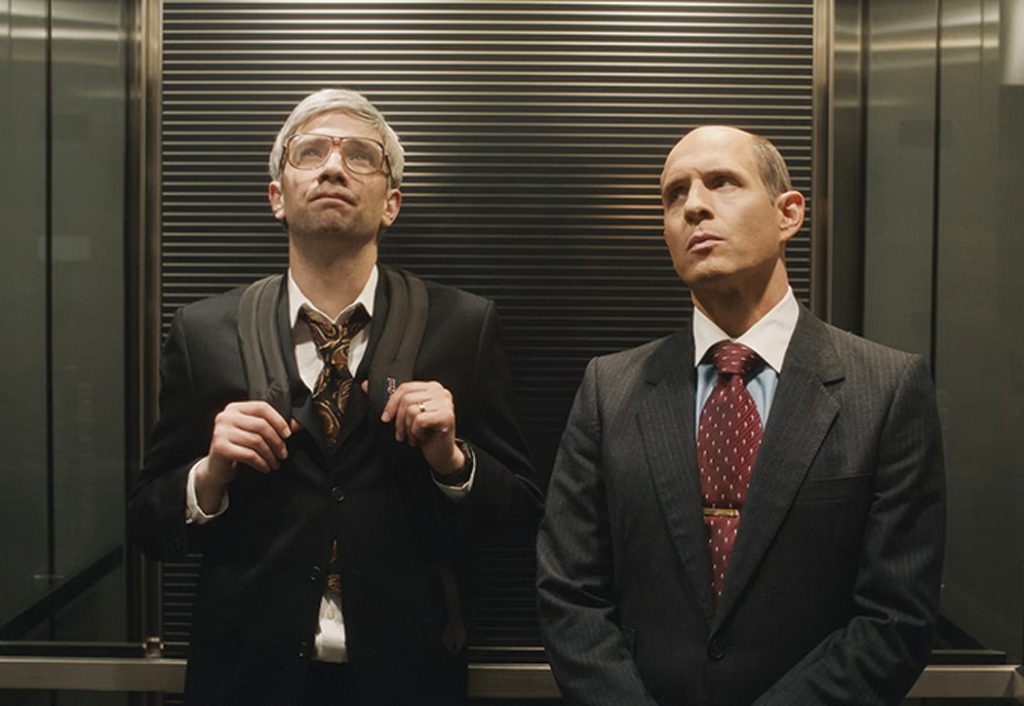
“The person who puts a computer inside a phone will change the world.” —BlackBerry creators Mike and Doug, quoting their high school shop teacher, Mr. Moshinsky
Users of the mighty BlackBerry, the world’s first smartphone, still have cherished memories of this revolutionary invention, for its reliable phone, text, and email functions; a professional-looking, pocket-size design; the soothing click of the keyboard; and an ergonomic shape that felt good in your hand. What’s not to love? In the world of business, the BlackBerry became ubiquitous. It was the essential tool, synonymous with success. It raised the status of thumbs. And its use became so addictive it was nicknamed the “crackberry.”
Streaming on Prime Video, BlackBerry is drawn from the 2015 book, Losing the Signal: The Untold Story Behind the Extraordinary Rise and Spectacular Fall of BlackBerry, written and researched by journalists Jacquie McNish and Sean Silcoff. As the movie discloses upfront, this is a fictionalized account inspired by real people and events. BlackBerry revisits the late 1990s, the days of olde when we accessed the internet via roaring modems that hijacked our phone connection. The days when Netscape hosted browsing online, while we slogged our way through websites teeming with typos and grammar violations. But there in Waterloo, Ontario, above a bagel shop, a small tech company called RIM (Research in Motion) was developing the concept of a portable, computerized phone. Pocket Link, the smartphone that eventually became the BlackBerry, introduced the world to the future.
BlackBerry evokes nostalgia for a unique and highly advanced device that made the world connectable. And unlike many of today’s electronics, BlackBerry’s vigilant designers manufactured their product close to home, rather than in China, to ensure high quality and prevent any annoying electronic hiss.
BlackBerry stirs a range of emotions while offering plenty of reasons to watch. But first, let’s address the big dead elephant in the room, which won’t be a spoiler if you tend to follow the news. Watching BlackBerry is a little like watching Titanic; we know we’re headed toward an iceberg. The company’s downfall costs only one life, but it’s the life of the beloved BlackBerry. The world’s first smartphone loses its entire 45 percent market share due to an existential shipwreck involving defective merchandise, delayed deliveries, new phone models with low appeal, and the launch of the Apple iPhone. There. Now we return to the life of the BlackBerry, created by a small Canadian company that went public and ruled the globe.
In spite of its ending, BlackBerry is unexpectedly entertaining. We revisit the tech culture of the 1990s, when RIM’s geeky young employees behaved like unsupervised children. Along with performing actual work, employees on the daily RIM routine thrived on distractions such as socializing, refreshments, video games, and watching movies. This mentality was nurtured by the company founders, Mike Lazaridis (Jay Baruchel) and Doug Fregin (Matt Johnson). Johnson, whose character sported long hair and a hippie-style headband, bearing no resemblance to the real Doug Fregin, was the film’s director. He was also the primary screenwriter, who allowed himself a long leash.
The office culture and business naivete may have been exaggerated for comic effect, especially in an opening scene where Mike makes a sales pitch for RIM’s smartphone concept. His presentation involves pulling an index card from his pocket and reading his Britannica-style notes out loud to an obviously disinterested listener. Our conclusion: not a good strategy for closing a sale, perfect for sketch comedy.
The company’s other crucial player is Jim Balsillie (Glenn Howerton). Balsillie, a Harvard graduate and the bored listener in the previous paragraph, joined RIM after losing his job. Balsillie is a smart, aggressive, arrogant businessman with a long yell and a short fuse, although according to a RIM employee, his character’s temper was exaggerated. Either way, Balsillie’s business and sales savvy were the missing ingredients for BlackBerry’s success, though his ethical decisions should have been supervised.
And now, compliments of History vs. Hollywood dot com, we visit some true background that predates the movie’s time frame. RIM was founded in 1984 by Lazaridis and Fregin while they were engineering students. And their talents were as impressive as their clients. Their early accounts included General Motors Corporation, for whom they designed digital display boards. They also made automated barcode readers for film-editing machines, which won them Oscar and Emmy technical awards, though the partners were more interested in security than awards. But a little background goes a long way to shed some light on the tech guy who makes presentations off his index cards.
BlackBerry leaves each of us with our own personal afterthoughts. Here are mine. Though RIM’s golden years were numbered, we honor the small company that captured communication in the palm of the hand. And we honor the small-business mindset of RIM’s founders, where quality is the priority and the purpose, the incentive that rewards the heart along with the wallet. The RIM founders may have lacked big-business savvy, but they cared about the products and services they delivered. When Jim tells Mike that “Perfect is the enemy of good,” Mike replies, “Good enough is the enemy of humanity.” Even when BlackBerry sales are swirling the drain, Mike never seems to lose sight of what’s important, as he opens the BlackBerry shipments and adjusts each device to silence the electronic hiss. Because he cared. Jim was the force that grew the business. But the founders’ high standards and love of technology imagined the almighty BlackBerry. They put a computer inside a phone and changed the world.
